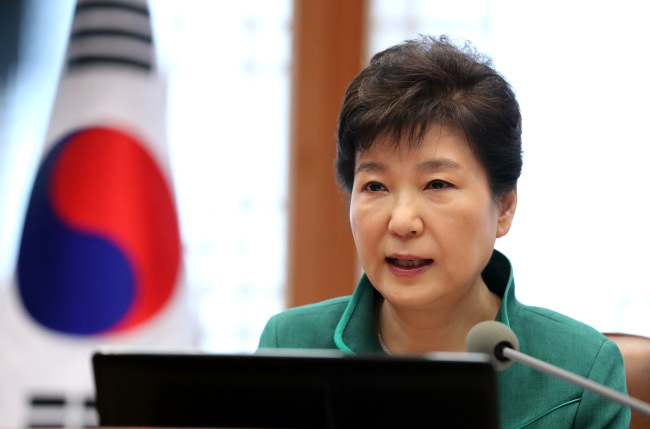Park vows ‘new, strong’ sanctions against Pyongyang
UN members condemn NK nuke test
By Korea HeraldPublished : Sept. 22, 2016 - 16:41
South Korean President Park Geun-hye on Thursday vowed to focus on crafting “new and strong” international sanctions against Pyongyang, saying Seoul will do all it takes to end North Korean leader Kim Jong-un’s “maniacal” obsession with nuclear arms.
During a meeting with her senior secretaries, Park pointedly noted that past efforts to resolve the decades-old nuclear standoff with the communist state through dialogue and negotiations failed to stop the growth of its nuclear program.

“I think that North Korea will not be interested in dialogue on denuclearization anymore, and that its nuclear and missile provocations will further escalate,” Park said during the meeting at the presidential office Cheong Wa Dae.
“Thus, the government will do its utmost to secure new, strong international sanctions at the UN Security Council that could actually coerce the North into renouncing its nuclear program, while it would separately take unilateral steps to pressure the North, in tandem with various other countries,” she added.
Despite international excoriations, Pyongyang has been ratcheting up cross-border tensions through its continued saber-rattling, including its recent ground test of a new rocket engine, which experts say appears to be designed for an intercontinental ballistic missile.
In an apparent swipe at those calling for dialogue with the provocative state, the commander-in-chief stressed that the general direction of Pyongyang’s nuclear development underscores the inefficacy of dialogue.
“(In the past) money was given to the North to get it to engage in dialogue, but the money was funneled into its nuclear program,” she stressed. “When negotiations were underway despite the absence of Pyongyang’s will, the North exploited the time to advance its nuclear capabilities behind the scenes.”
Meanwhile, the Foreign Ministry said its minister Yun Byung-se is likely to call into question North Korea’s qualifications as a member of the United Nations in his upcoming speech in New York.
In a recent interview with the Associated Press, Yun urged all countries to “ask themselves whether North Korea is really qualified to be a member of the U.N.” underlining its “broken record” in its violation of global norms. Yun, however, did not directly call for its expulsion.
Deputy Foreign Ministry spokesman Sun Nahm-kook said in a regular press briefing that Yun seemed to have mentioned the qualification issue in that the North has violated the UN charter that it vowed to observe when joining in 1991 by repeatedly ignoring its resolutions in pursuit of nuclear and missile tests.
“As far as I know, such references will likely to be included in the minister’s speech,” he said.
The UN Security Council is currently working on drawing up an additional resolution to punish the North for conducting its latest and most powerful nuclear test on Sept. 9. This followed the fourth test in January, which drew the strongest ever punitive resolution from the council in March.
At the UN on Wednesday, Japanese Prime Minister Shinzo Abe demanded the world find a new way to halt the threat from North Korea after the long-sanctioned regime’s nuclear and missile tests.
“There is no alternative but to say that the threat has now reached a dimension altogether different from what has transpired until now,” Abe said.
“The threat to the international community has become increasingly grave and all the more realistic. It demands a new means of addressing it, altogether different from what we applied until yesterday,” he said.
Abe did not spell out specific actions but said Japan would use its nonpermanent seat on the Security Council to explore new options.
Chinese Premier Li Keqiang, for his part, said Wednesday that countries must remain committed to denuclearization of the Korean Peninsula while seeking a solution to the North Korean nuclear issue through dialogue.
Li, in a speech to the UN General Assembly, urged new efforts to “reach a comprehensive political solution on the Korean nuclear issue.”
Meanwhile, dozens of UN member states on Wednesday condemned North Korea’s fifth nuclear test and urged the communist nation to conduct no more testing, abide by its international obligations and scrap all of its nuclear weapons and programs.
The foreign ministers of about 40 countries supportive of the Comprehensive Nuclear Test Ban Treaty made the appeal in a joint statement adopted when they held a meeting in New York on the sidelines of the UN General Assembly to call for the treaty’s ratification.
“The meeting was unanimous in condemning the recent announced nuclear test by the Democratic People’s Republic of Korea and in urging all states who have not yet done so to sign and/or ratify the CTBT,” the CTBT said, using the formal name for North Korea.
The CTBT was opened for signatures in 1996 and then-President Bill Clinton was the first world leader to sign the treaty, but US Congress has yet to ratify it. Currently, 183 nations have signed the treaty and 166 have finished ratification.
But the treaty has not taken effect yet because eight countries have yet to ratify it. North Korea, India and Pakistan didn’t sign the treaty, while the US, China, Egypt, Iran and Israel signed the pact, but have not ratified it yet.
From news reports
-
Articles by Korea Herald







![[Graphic News] More Koreans say they plan long-distance trips this year](http://res.heraldm.com/phpwas/restmb_idxmake.php?idx=644&simg=/content/image/2024/04/17/20240417050828_0.gif&u=)
![[KH Explains] Hyundai's full hybrid edge to pay off amid slow transition to pure EVs](http://res.heraldm.com/phpwas/restmb_idxmake.php?idx=644&simg=/content/image/2024/04/18/20240418050645_0.jpg&u=20240419100350)






![[From the Scene] Monks, Buddhists hail return of remains of Buddhas](http://res.heraldm.com/phpwas/restmb_idxmake.php?idx=652&simg=/content/image/2024/04/19/20240419050617_0.jpg&u=20240419175937)

![[KH Explains] Hyundai's full hybrid edge to pay off amid slow transition to pure EVs](http://res.heraldm.com/phpwas/restmb_idxmake.php?idx=652&simg=/content/image/2024/04/18/20240418050645_0.jpg&u=20240419100350)

![[Today’s K-pop] Illit drops debut single remix](http://res.heraldm.com/phpwas/restmb_idxmake.php?idx=642&simg=/content/image/2024/04/19/20240419050612_0.jpg&u=)